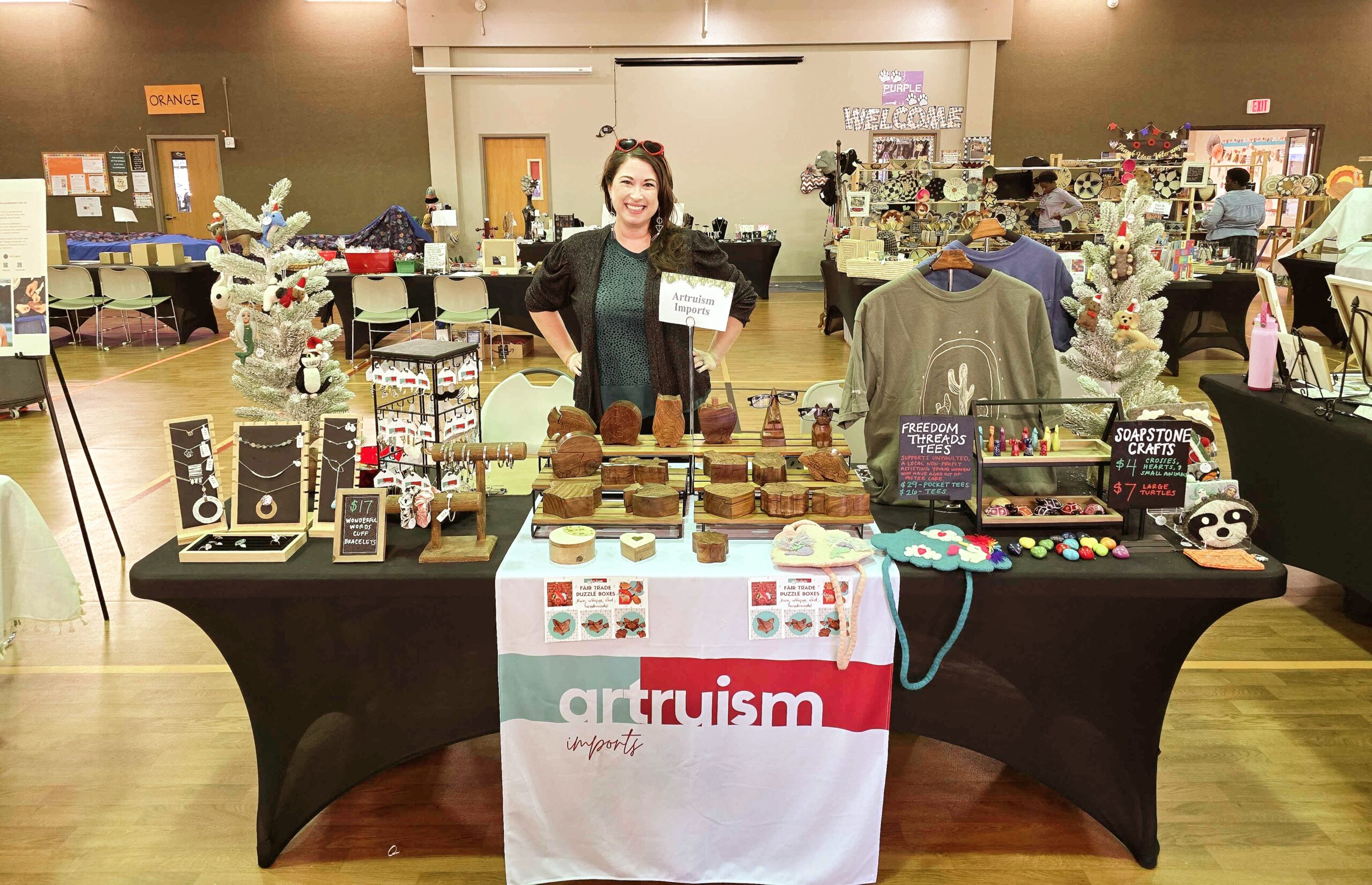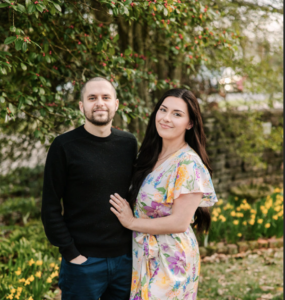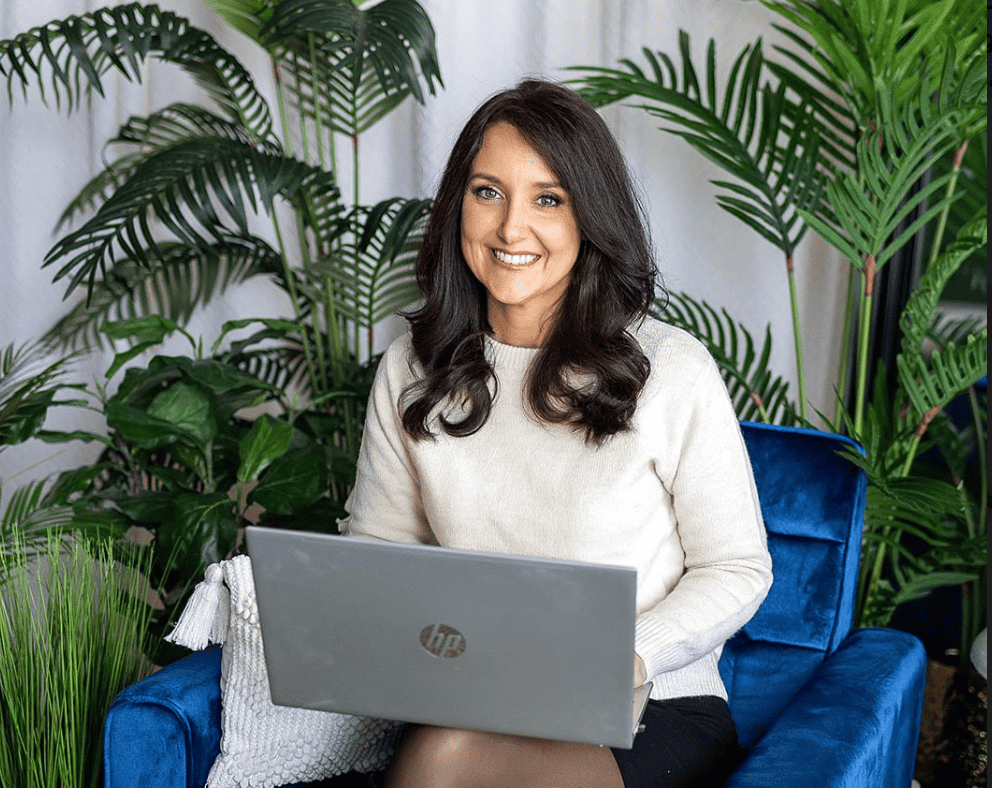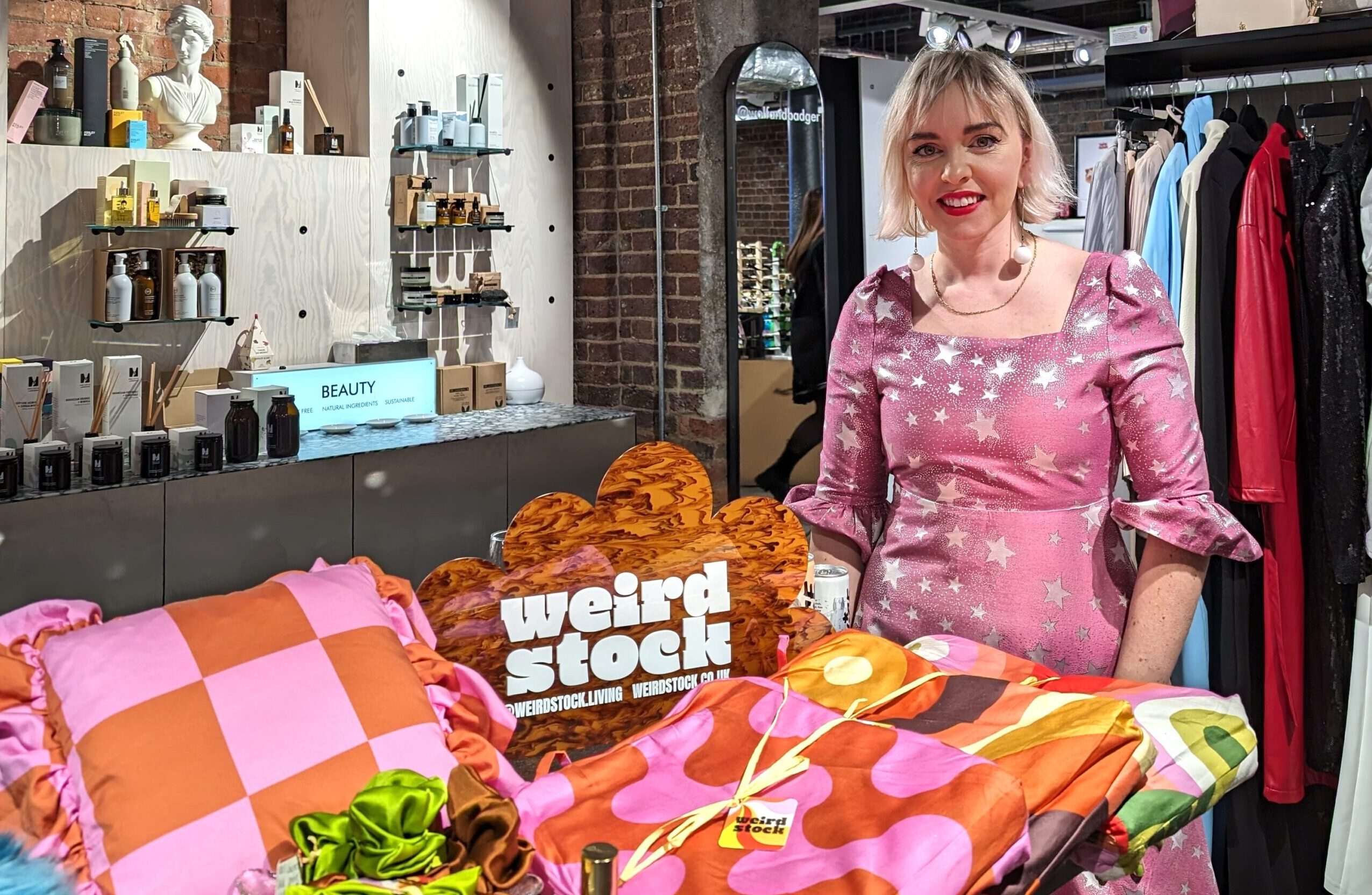In founding Artruism Imports, Meredith Blair’s journey toward creating a socially conscious business began with a life-changing internship during college, where she discovered the mission of Fair Trade. Motivated by the need to shed light on the invisible struggles faced by workers, especially women, in the global supply chain, Meredith embraced the goal of ethical entrepreneurship. Her personal experiences navigating modern-day slavery awareness, her commitment to promoting small but impactful changes, and her dedication to balancing heavy realities with messages of hope have become the heart of Artruism Imports. Through this venture, Meredith educates consumers about ethical purchasing while fostering a supportive community that empowers individuals to make a difference, one thoughtful decision at a time.
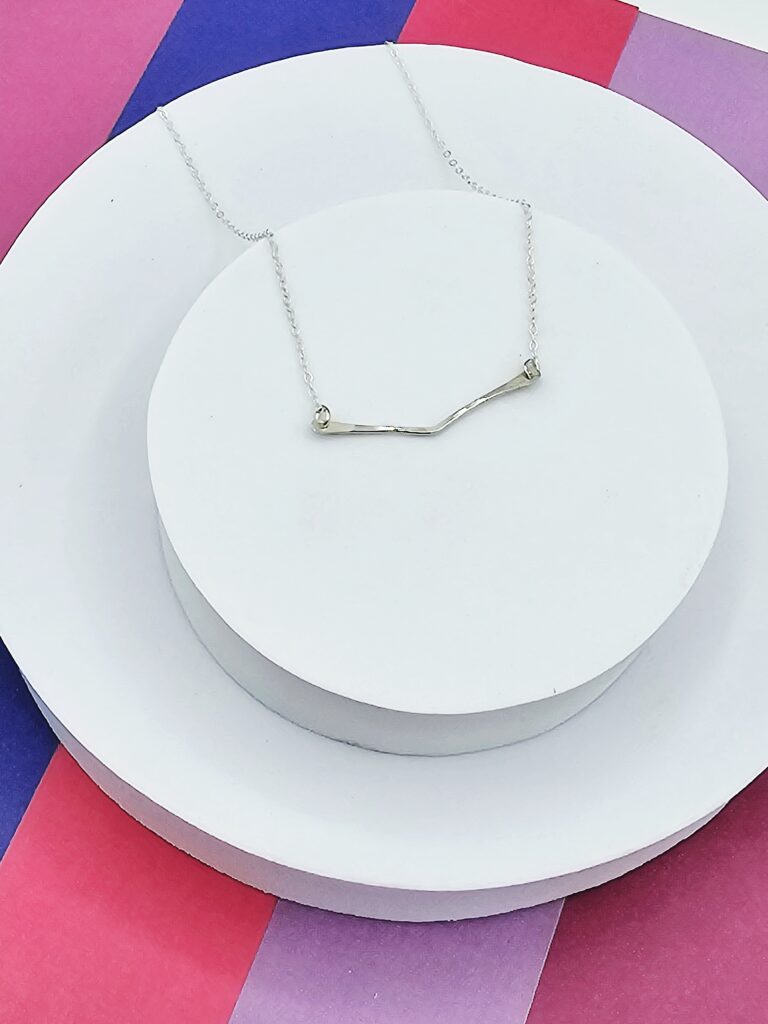
What inspired you to create Artruism Imports, and how does your personal story influenceyour work?
My inspiration to create Artruism Imports began my junior year of college. I was taking business classes and seeking out an internship opportunity. I knew my ideal internship would be with a company that supported women and their creativity, but I was struggling to find an opportunity that felt right for me- and the clock was ticking. A friend introduced me to a local Fair Trade shop called Eternal Threads, and the owner agreed to mentor me. The opportunity fit the parameters of my ideal internship, but as it turned out, it fulfilled so much more- it changed my life.
Can you share more about the life-changing internship with a Fair Trade business and how it shaped your vision for Artruism Imports?
Prior to my internship, I had no concept of the meaning or mission of Fair Trade. I had so many questions! When the owner explained to me the mission of Fair Trade- to create a world where all workers can enjoy secure and sustainable livelihoods so that they can thrive and have the freedom to decide on their own futures- I only
had more questions. I learned that many people around the world, particularly women, are paid little to nothing for the work that they do. These same women create products we buy everyday- clothes, jewelry, shoes, home décor, and more. Because these workers live far away from us, and because they are so far down in a product’s supply chain, they and their situations are invisible to us. Fair Trade’s goal is to shine a light on the people who create the products we buy, so that they are no longer invisible to us. I whole-heartedly embraced that mission and determined that I would someday create a Fair Trade business of my own.
What challenges have you faced in educating people about modern-day slavery and promoting ethical purchasing?
There are two main challenges I face when educating people about modern-day slavery and promoting ethical purchasing. The first is the challenge of pulling back the curtain on an issue of which some people are unaware or are only vaguely aware. It is difficult for me to be the bearer of bad news, particularly since we have all participated in modern-day slavery, whether we knew it or not. This is, understandably, a difficult realization for people to have. When I first learned it, I felt heart-broken, so I understand their feelings! The second challenge I face follows the first- after learning about modern-day slavery, people who want to make a difference often jump to extremes. Either they feel that changing the way they purchase is impossible, or they try to change all their purchasing habits at once. They either experience hopelessness, or they burn out trying to single-handedly change the world. As someone who has experienced both extremes, I empathize! It is so hard to change your buying habits and changing them all is unrealistic. The advice I always give is to make small changes, and then build upon them. Small consistent changes are key.
How do you balance raising awareness about serious issues with providing hope and practical
solutions to your audience?
Balancing awareness about serious issues while providing hope and practical solutions can be challenging, but it is so important. We live in a world where we are bombarded with news of tragic events and disheartening stories, and it can be very overwhelming! In order to combat this, I have a motto that I live by- do not talk about injustice without talking about improvement. Anytime I bring up the injustices that Fair Trade is combatting, I always follow up that information with either hope or solutions. Whether the improvement is statistics I provide to show that the problem is getting better, or the
improvement is a list of helpful ways that we can make real change, I will never speak about
injustice and leave it at that.

Can you describe a specific instance where you successfully helped someone understand and
make a more ethical purchasing decision?
I have been so fortunate to have people be so receptive to the idea of making more ethical purchasing decisions. One instance when I helped someone make a more ethical purchasing decision was when a friend reached out to me about finding ethical chocolate candy for her kids. She was struggling with wanting to find a better chocolate candy for treats for her kids but was also needing to find chocolate that worked within the parameters of one of her kid’s dietary restrictions. I was able to help her find a brand that the kids liked and that worked for her child.
How do you manage the emotional weight of addressing such a heavy topic while staying motivated and inspired?
Managing the emotional weight of addressing a heavy topic while staying motivated and inspired can be challenging! When I am feeling overwhelmed by the scope of issues like modern-day slavery, I take the time to sit down and say a prayer for the victims and survivors. I also pray for the people in the world who are making things better- that they will feel encouraged and hopeful. I also love reading books and listening to podcasts about people who have used their time, resources, and capabilities to make the world better. These people are so inspiring! I also make sure to take time to relax. I find that self-care is often hard for entrepreneurs, but it is so important to take time to rest and do activities you enjoy.
What strategies do you use to maintain your mental health and well-being while running
Artruism Imports?
I truly believe that one of the essential ways to maintain mental health while running a small business is to have a support system. Running a small business is incredibly rewarding but is also very lonely. Whether that support system is a like-minded group of entrepreneurs you chat with online, a small group of supportive women you meet with in person, or family and friends who encourage you and ask about your business, it is vital to have people with whom to talk, vent, and receive honest feedback and encouragement.

How has your understanding of modern-day slavery evolved since starting your business, and what new insights have you gained?
My understanding of modern-day slavery has evolved so much since I first began Artruism Imports. I have gained the most insight from hearing and reading about the experiences of people who have experienced modern-day slavery firsthand. These women have showed me how sexism, poverty, racism, and cultural norms all play a big role in how women are treated, and the number of limited options they have available to them. Until you hear first-hand accounts, it can be easy to become prideful and assume you know more than you do. I am grateful for their bravery in telling their stories.
What advice would you give to other women who want to create a business that addresses social justice issues?
The advice I would give to other women who want to create a business that addresses social issues is to find a support system. This can be found through friends, family, and small business associations, but it can also be found in your competition! Other socially conscious businesses may be competing for similar customers, but their primary goal is the same as yours- to use business for good. I have received kind messages, advice, and recommendations from other socially conscious businesses in the same space, and I am very grateful for their insight and passion.
What are some practical ways that individuals can support ethical practices and contribute to
positive change?
This is one of my favorite questions! There are so many practical ways that individuals can support ethical practices and contribute to positive change. When someone comes to me asking for advice on how to change their buying habits, I break down the first step into two main categories- Everyday and Special Occasion. Everyday items are things you use every day- food, clothes, toiletries, etc. I ask them to take one of those items and switch it to an ethical alternative. For me, my first switch was changing the coffee I bought to a Fair Trade
certified coffee brand. Once you find an ethical alternative you love, you can keep buying it again and again, and then choose another everyday item to make the switch. The second category of step one is Special Occasion. I ask people that the next special occasion they have upcoming- whether it is a birthday, anniversary, teacher appreciation gift, or holiday- to purchase a gift for that person from an ethical brand. Once people are able to take this first step, they begin to feel more confident that they can make more ethical purchasing decisions.
What message would you like to share with other women who are passionate about making a difference through their work?
The main message I would share with other women who are passionate about making a difference through their work is this reminder- your passion matters. This is a mantra I repeat to myself when I am knee-deep in the day-to-day minutia of running a business, and I ask myself, “Why am I doing this?” I repeat this to myself when I encounter people who don’t understand my mission. I repeat this to myself when I feel that I am not making enough of a difference in the world. There will simply be days when we don’t feel the emotion behind our cause, but that doesn’t mean your passion doesn’t matter. Even on hard days, the work you do matters.
